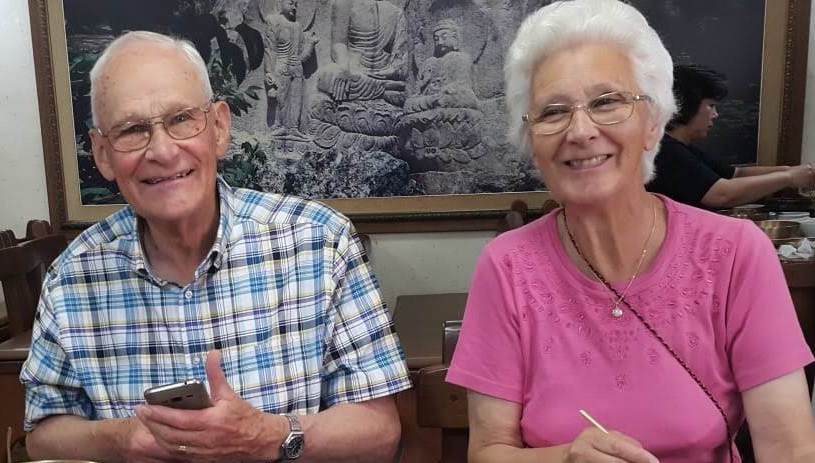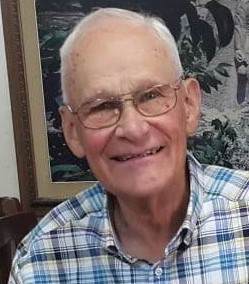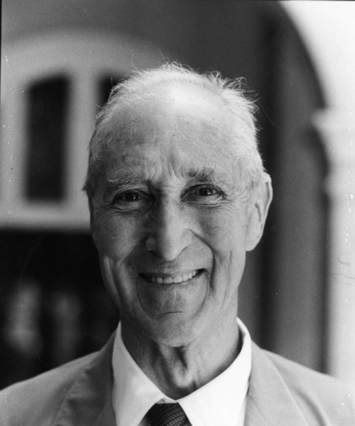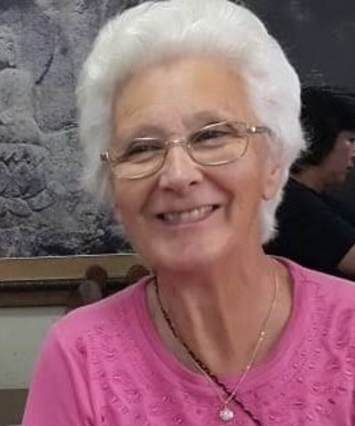I was 19 years old and in the British Air Force, doing two years of National Service, when I met Revd Cecil King. I had just been posted to a new station in Norfolk, where he was the campus chaplain. He introduced me to the ideas of MRA (now known as Initiatives of Change).
It was January 1954 and, feeling pretty miserable about life, I decided to go to the evening service at the chapel on the camp. I had been brought up a Christian, sung in the church choir and had been an altar server but in the Air Force my life didn’t seem at all relevant. I had learned to swear and was drinking too much and basically wanted to be accepted as ‘one of the boys’. But I went to the church and was struck by a certain quality in the chaplain, Cecil King.
I started to go regularly and after the services Cecil would invite any who wished to come to a hut nearby where he served tea, coffee and eats and where one could play table tennis and similar games. I saw a notice on the board advertising a moral leadership course. Something said to me that I ought to be taking moral leadership. So I asked Cecil about it. He didn’t particularly recommend that course but said that if I wanted to take moral leadership I should start with myself.
He told me about four standards of absolute honesty, absolute purity, absolute unselfishness and absolute love and he asked me some very searching questions. He suggested I look at my life in the light of these standards and see how I measured up. I immediately stopped smoking, swearing and drinking. He also introduced me to the idea of the quiet time in which one could ask God for direction in life. This was a new dimension of prayer.
As I sat quietly and listened for direction I had the clear thought that I should pray by my bed every night. This was in a barrack room with 25 other men of about my age. The music was blaring from a radio, with popular songs and there was much banter. I quite expected something to be thrown at me as I knelt but nothing happened. I didn’t know how that action would be received but it was an important step for me because I was very concerned about what others thought of me.
A few days later, one of my friends told me something he was worried about. Unlike most of us he was a married man and he had some concerns about his wife. Then someone else shared something they were worried about and I realised that I could actually help other people.
A person of my age was Harold. He had met MRA through Cecil a year earlier, so he became a sort of mentor or elder brother to me. He and I used to share the thoughts from our quiet times. In fact a group of us started to practise quiet times. We would rise before reveille and meet in the chapel where we would have a quiet time together, writing our thoughts in a notebook and then sharing them with each other. We tried to develop a strategy to influence others, but I don’t think we were very successful.
There were others who helped me to change. One man was Admiral Cochrane. I met him at 45 Berkeley Square, part of the London headquarters of MRA. The armed services have a very hierarchical structure and I was an ordinary airman with no rank. At that time I was feeling quite bitter about the way some of the officers treated us ordinary men. When I met Admiral Cochrane, however, he showed a great care for me and wanted to know all about me and my life. I was deeply touched.
One day Cecil King took a group of us to visit a farm in Suffolk. It was owned by a family who were part of the network of MRA. I met the parents and the two sons but the two who impressed me most were the two daughters. They served us a meal and there was a purity there which I had not encountered before in any of the girls I knew. I was conscious that there was something in that purity that I wanted.
Others who helped me change over the years included Blyth Ramsay, a former dockworker from the Clyde in Scotland. He had been working with MRA for many years. Looking back I can see how class conscious I was. I had grown up feeling superior to people who worked with their hands and, as a state Grammar School boy, inferior to those who had attended so called ‘public’ schools (Independent schools). I worked with Blyth for a while in the 1960s, when we went to Bradford together to do advance promotion for an MRA play called Mr. Wilberforce, MP, due to be performed there. Blyth was great fun to work with--very relaxed and extremely well read. He and others like the Scarth brothers helped me to a new understanding of the workers’ struggle and the role of the trades unions.
Have I helped other people to change? A more difficult question because I am sure it is God who works in people to help them change and that is why prayer is so important. However, I will recount one incident from my Air Force days. As I said above, the armed services are very hierarchical. One of our officers was very aggressive and, I felt, did not treat any of the men with much respect. One day he came to our barrack room and, as was the custom, we were all told to stand up by our beds. I was feeling very rebellious that day and thought, ‘There is no way I am going to stand up for this man.’ So I remained seated. He did not notice but the next day in my time of quiet reflection I had the clear thought that I had not respected his authority and I should apologise to him.
How to do so? I asked the clerk who worked in his office if he could get me an interview with the officer, but the answer came back ‘no’. So I thought I should write a letter of apology to him. Immediately I was asked to go and see him. He said, ’What is all this about?’ So I explained that I was sorry I had not respected his authority and I had been wrong. I said I had decided to live my life by absolute standards of honesty and unselfishness and realised I had not done that. I must have told him other things about listening to God’s voice. Anyway, in the days that followed I noticed a change in him. His attitude towards the men seemed to change and he became much more human. Was this my imagination? I know at the time I thought it was real, certainly in the way he treated me but I think also in his treatment of all of us. This gave me encouragement that when I obey the thoughts that come others could change as well as me.
It is God who effects the change in people but we can perhaps be catalysts. In our relationships with others I like the term “accompaniment”, for all of us are on a journey. I may have helped others I have accompanied and others have certainly helped me.
I left the Air Force at the age of 20 and as I look back on my life at the age of 86 I see that my original experience of change was only the beginning. I have learned that it is important to go on changing. I worked for 10 years in the insurance industry, where I started out being very ambitious, but through listening to God in my quiet times, I realised that I was in a service industry and that instead of thinking of myself I was meant to serve others. Later I was assistant manager at the Westminster Theatre, owned by MRA and dedicated to performing plays with MRA values giving hope and faith to people. There I learned to open my heart to hundreds of customers who came to see the shows, night after night.
In 1969 it was my great joy to marry Elizabeth. She was a country person by upbringing and found marrying a ‘townie’ quite a challenge. She has helped me to have a quite new level of appreciation for the natural world.
After some few years overseas, both of us worked as executive directors of Grosvenor Books, a publishing house set up by MRA people, where we learned a lot working with authors. Many of them were the pioneering generation of MRA who wrote their own experiences of change and how, in many countries, the still small voice could guide and direct.
Now in our 70s and 80s we continue to seek direction from the still small voice, to try to change ourselves and help others find new life and hope.
英語




